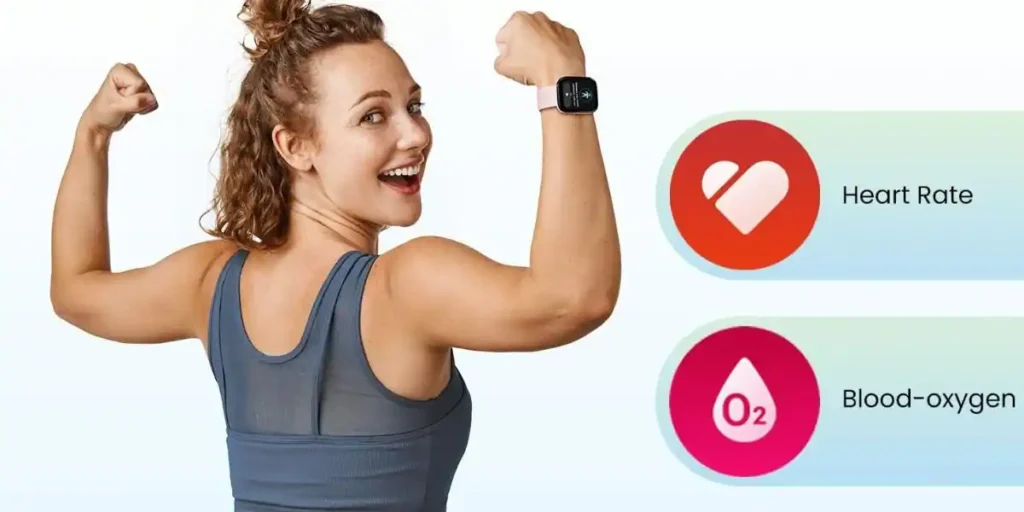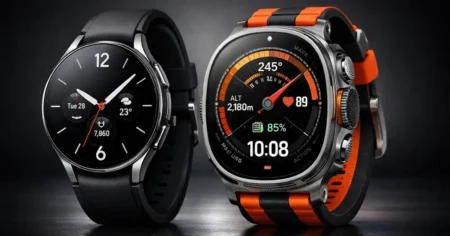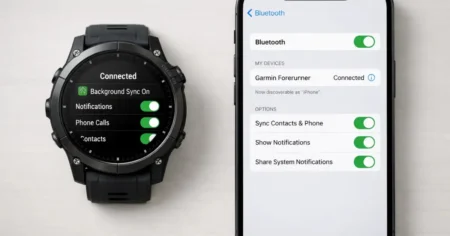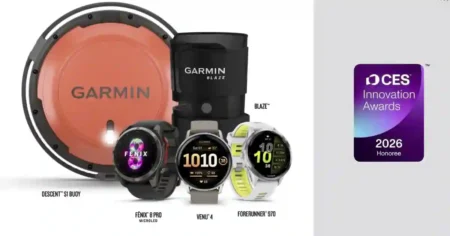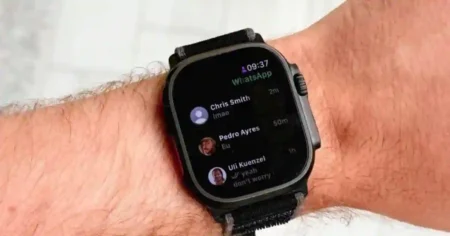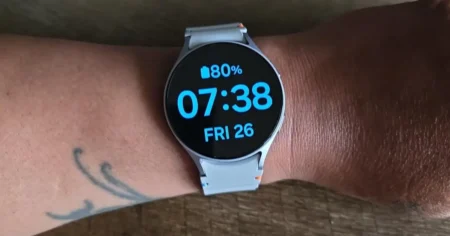In recent years, the advent of smartwatches has transformed the landscape of health monitoring and management.
These innovative wearable devices, equipped with an array of sensors and features, are not just timekeeping accessories but powerful tools that empower individuals to take control of their well-being.
According to Deloitte’s survey, almost 40% of Americans have one of these gadgets, and they’re collecting a bunch of information. People use them to count steps or track workouts, but now they’re also checking things like heart health, sleep, calories, and even signs of sickness.
In this blog post, we will explore the profound impact of smartwatch on health and wellness, delving into their capabilities, benefits, and potential concerns.
The Rise of Smartwatches in Health Monitoring
Smartwatches have emerged as versatile devices that go beyond traditional timekeeping.
Their integration of various sensors allows users to monitor a wide range of health metrics, providing a comprehensive picture of their physical well-being.
From heart rate monitoring and step tracking to sleep quality analysis and stress management, these devices have become indispensable companions for those seeking to lead healthier lives and they can also encourage healthy behaviors and lifestyle changes.
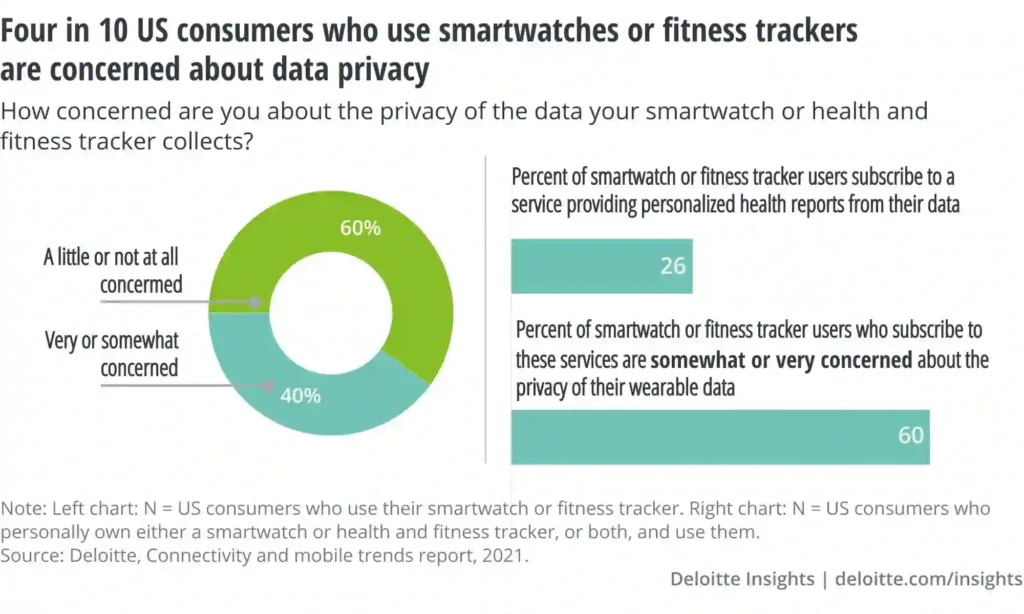
Heart Rate Monitoring
One of the standout features of smartwatches is their ability to monitor heart rate continuously.
This real-time data not only helps users keep tabs on their cardiovascular health but also enables early detection of potential issues.
The smartwatch can alert users if their heart rate is consistently elevated, prompting them to seek medical advice.
Step Tracking and Physical Activity
Smartwatches act as personal fitness coaches, encouraging users to stay active throughout the day.
Step tracking and activity reminders motivate individuals to incorporate more movement into their routines, fostering better cardiovascular health, weight management, and a reduced risk of chronic diseases.
Sleep Quality Analysis
Quality sleep is integral to overall well-being, and smartwatches now offer insights into sleep patterns.
By monitoring sleep duration and quality, users can identify areas for improvement and make lifestyle adjustments for better rest.
Some smartwatches even provide recommendations to enhance sleep hygiene.
Stress Management Features
Stress has become a prevalent aspect of modern life, and smartwatches address this by incorporating stress-tracking features.
By analyzing physiological indicators like heart rate variability, these devices help users recognize stress triggers and take proactive steps to manage and reduce stress levels.
Motivating a Healthier Lifestyle
The gamification of health through smartwatches has proven to be a powerful motivator for individuals looking to adopt a healthier lifestyle.
The combination of real-time feedback, goal setting, and friendly reminders fosters a sense of accountability, turning health management into an engaging and rewarding experience.
Activity Reminders
Smartwatches nudge users with gentle reminders to move throughout the day.
These reminders, often personalized based on individual activity levels, break up prolonged periods of inactivity and contribute to a more dynamic and healthier daily routine.
Goal Setting and Achievement
Setting and achieving health goals is made more accessible and enjoyable with smartwatches.
Whether it’s reaching a daily step count, maintaining a target heart rate during workouts, or consistently getting a certain amount of quality sleep, users can track their progress and celebrate achievements directly from their wrists.
Social Connectivity
Many smartwatches offer social features that allow users to connect with friends and family.
It not only fosters a sense of community but also turns health and fitness into a social endeavour.
Friendly competitions, shared goals, and mutual support contribute to a more positive and motivating health journey.
Transforming Healthcare Practices
Beyond individual users, smartwatches are reshaping how healthcare is delivered and managed.
The ability to collect and transmit real-time health data provides healthcare professionals with valuable insights, leading to more proactive and informed care.
Remote Patient Monitoring
Smartwatches enable remote patient monitoring, allowing healthcare providers to keep a close eye on their patient’s health without requiring frequent in-person visits.
It is particularly beneficial for individuals with chronic conditions or those in need of continuous monitoring.
Informed Decision-Making
Access to real-time health data empowers healthcare professionals to make more informed decisions about patient care.
Trends, anomalies, and changes in health metrics can be identified promptly, enabling timely interventions and personalized treatment plans.
Improved Outcomes and Cost Reduction
The integration of smartwatches into healthcare practices has the potential to improve patient outcomes and reduce healthcare costs.
Early detection of health issues, proactive management of chronic conditions, and streamlined communication between patients and healthcare providers contribute to a more efficient and effective healthcare system.
Addressing Concerns: Fixation on Health Metrics and Privacy
While the benefits of smartwatches in health management are undeniable, there are valid concerns that need addressing to ensure a balanced and responsible use of these devices.
Fixation on Health Metrics
Some experts express concerns that constant tracking and monitoring may lead to an unhealthy fixation on health metrics.
Users may become overly focused on the numbers, potentially resulting in stress and anxiety rather than the intended positive impact on well-being.
It’s essential to strike a balance and promote a holistic approach to health that considers various factors beyond numerical metrics.
Privacy and Security
With the vast amount of personal health data collected by smartwatches, privacy and security concerns come to the forefront.
Safeguarding this sensitive information is paramount to ensure users feel confident in using these devices.
Manufacturers and service providers must implement robust security measures, transparent data practices, and clear user consent mechanisms to protect user privacy.
How do Smartwatches Compare to Other Wearables in Terms of Health and Fitness Tracking
Smartwatches and fitness trackers are both popular choices for individuals looking to monitor their health and fitness. Here’s how they compare in terms of health and fitness tracking:
Smartwatches
Capabilities: Smartwatches are more technology-packed and capable than fitness trackers. They offer a wide range of features, including health and fitness metrics, smartphone integration, texting, calling, and app integrations.
Complement to Smartphone: Smartwatches are often seen as a complementary device to a smartphone, offering advanced features beyond health and fitness tracking.
Price: Smartwatches tend to be more expensive than fitness trackers due to their advanced capabilities.
Fitness Trackers
Dedicated to Health and Fitness: Fitness trackers are more dedicated to monitoring workouts and well-being. They typically offer excellent workout tracking features and are focused on health and fitness monitoring.
Affordability: Fitness trackers are generally smaller, lighter, and more affordable than smartwatches, making them a budget-friendly option.
Overlapping Features
Health and Fitness Tracking: Both smartwatches and fitness trackers offer standard health and fitness tracking features such as monitoring activity, heart rate, sleep patterns, and more.
Wearable Technology Advancements: Wearable technology, including smartwatches and fitness trackers, has advanced significantly, offering features that can improve health outcomes and detect diseases.
In summary, smartwatches are more versatile, offering a wide range of features beyond health and fitness tracking.
In contrast, fitness trackers are more focused on monitoring physical activity and well-being.
Both devices provide valuable health insights, and the choice between them depends on individual preferences, budget, and the specific features one is looking for.
What are the Limitations of Using a Smartwatch for Health Monitoring?
While smartwatches offer impressive features for health monitoring, they do come with certain limitations. Here are some common drawbacks:
- Accuracy Concerns:
- Heart Rate Monitoring: Smartwatches may not always provide precise heart rate measurements, especially during high-intensity activities or if the device is not fitted properly.
- Calorie Tracking: Calorie expenditure calculations are often based on generalized algorithms, which may not accurately represent individual metabolic rates.
- Limited Medical-grade Accuracy: Smartwatches are not medical devices. While they offer valuable insights, the data they provide may not meet the rigorous standards of medical-grade accuracy required for clinical decision-making.
- Sleep Tracking Challenges: Sleep tracking relies on movement patterns and heart rate fluctuations, which might not provide a comprehensive picture of sleep stages. It may not be as accurate as professional sleep studies conducted in a clinical setting.
- Stress Tracking Reliability: Stress-tracking features, while useful, might not be entirely accurate in measuring stress levels. Various factors can influence heart rate variability, and stress is subjective, making it challenging to quantify accurately.
- Limited Battery Life: Regular charging is required, and the battery life of smartwatches varies. Some may need to be charged daily, impacting continuous health monitoring, especially during sleep.
- Data Privacy Concerns: The extensive personal health data collected by smartwatches raises concerns about privacy. Users may worry about how their sensitive information is stored, shared, and protected.
- Dependency on Connectivity: Smartwatches often rely on a connection to a smartphone or a network. Limited connectivity can impact the real-time transmission of data and updates.
- Not Universally Accessible: Not everyone can afford or use a smartwatch. This creates disparities in access to health-monitoring technology, potentially leaving certain demographics without the benefits.
- One-size-fits-all Approach: While smartwatches aim to cater to a broad audience, they may not suit everyone’s needs. Individuals with unique health conditions or specific requirements might find the generic features less tailored to their situation.
- Device Wearability Issues: Comfort and wearability can be subjective. Some users may find wearing a smartwatch uncomfortable, leading to inconsistent use and, consequently, unreliable data.
Despite these limitations, smartwatches remain valuable tools for many users seeking convenient and accessible ways to monitor and improve their health.
It’s essential for users to be aware of these limitations and consider them when interpreting the data provided by their devices.
Additionally, manufacturers continue to address these challenges, striving to enhance the accuracy and reliability of health-related features in future iterations.
Conclusion: Impact of Smartwatch on Health and Fitness
In conclusion, smartwatches have ushered in a new era of health and wellness, providing users with tools to monitor, manage, and improve their well-being.
From heart rate monitoring and step tracking to sleep analysis and stress management, these devices offer a comprehensive approach to health.
The motivational aspects, coupled with the transformative impact on healthcare practices, make smartwatches a valuable asset in the pursuit of a healthier and more connected future.
As we embrace the benefits of smartwatches, it is crucial to address concerns, foster responsible usage, and continue innovating to maximize the positive impact on individual and public health.

